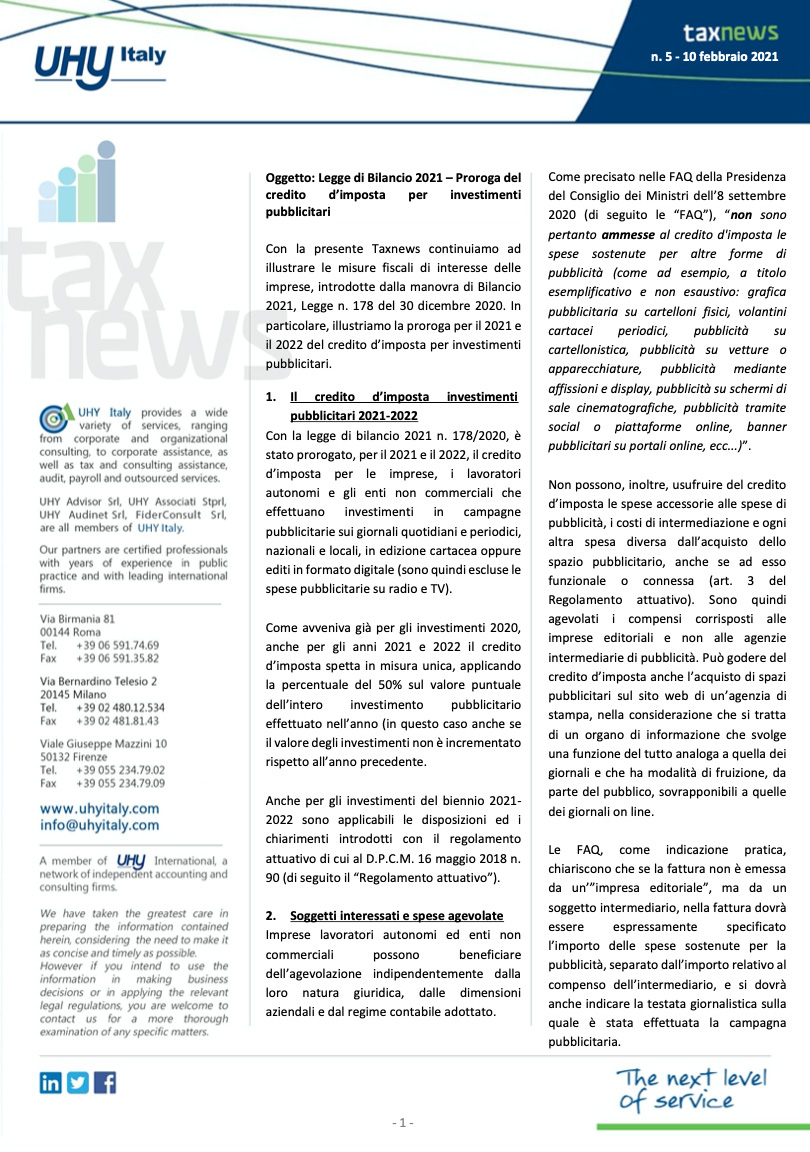

Sergio Fedele - 12/31/2024
HR News 4/2024
2025 Budget Law and 2025 Milleproroghe Decree Law
The 2025 Budget Law has been approved, featuring significant measures in the areas of taxation, welfare, and social security. Key initiatives include provisions for the South, family support, and pension reforms. Additionally, the 2025 Milleproroghe Decree introduces important extensions in the fields of labor and social assistance.
On the morning of December 28th, the Senate approved the 2025 Budget Law with 108 votes in favor, 63 against, and one abstention. The budget proposal, which also includes the multi-year budget for 2025-2027, is now ready to be published in the Official Gazette. Several significant measures have been introduced, particularly concerning the fiscal system, welfare, and social security. Key points include:
- Tax Cut and IRPEF Reform: The fiscal wedge reduction, as outlined in the Budget Law, will be transformed into a bonus of up to €20,000, with a deduction system reaching up to €40,000. This measure will affect 1.3 million additional workers compared to the previous year, due to the increase in the income threshold from €35,000 to €40,000. The IRPEF tax brackets will remain stable, with a 23% rate for incomes up to €28,000, 35% for incomes between €28,000 and €50,000, and 43% for incomes above €50,000. Regional and local tax rates will remain unchanged until 2027.
- Southern Italy Bonus: New provisions for decontribution are introduced for Southern Italy. Although the benefit will decrease from 30% to 25%, with a gradual reduction to 20% in 2026 and 15% by 2029, this will still provide a valuable opportunity for micro and small businesses employing permanent workers in the regions of Abruzzo, Molise, Campania, Basilicata, Sicily, Puglia, Calabria, and Sardinia. Businesses outside the specified categories may obtain exemptions only with EU authorization, provided they show an increase in permanent employment from the previous year.
- Tax Exemption on Performance Bonuses: For the bonuses and amounts paid in 2025, 2026, and 2027, Article 385 reduces the substitute tax rate on productivity bonuses, as outlined in Article 1, paragraph 182 of Law No. 208/2015, from 10% to 5%.
- Rent Bonus for Newly Hired Workers: Paragraphs 386 to 391 introduce an incentive for workers who move their residence more than 100 kilometers away from their The benefit consists of a tax exemption of up to 5,000 euros annually for amounts paid by employers for rent and maintenance of the homes of employees hired with permanent contracts between January 1 and December 31, 2025. To qualify, the worker must have earned no more than 35,000 euros in the period prior to hiring and must have moved their residence over 100 kilometers from their previous workplace, providing a specific declaration. The exemption applies for the first two years of employment, does not affect social security contributions, and is included in the ISEE for welfare and pension benefits.
- Fringe Benefits: For the 2025, 2026, and 2027 tax years, paragraphs 390 and 391, in derogation from Article 51, paragraph 3 of the TUIR, increase the exemption threshold from taxable income (and the substitute tax benefit) for employees, raising it from 258.23 euros to 1,000 euros (2,000 euros for employees with dependent children). This exemption applies to: a) The value of goods and services provided to employees; b) Amounts paid or reimbursed by the employer for the following expenses: domestic utility bills for integrated water services; electricity and natural gas; rent for the primary residence; mortgage interest on the primary residence.
- Restaurant and Tourism Sector, Tips: Paragraph 520 amends the provisions of Law No. 197 of 2022 regarding the taxation of tips in the restaurant and tourism sectors. Starting January 1, 2025, tips received by workers in these sectors (with annual income up to 75,000 euros) will be considered employment income and, unless waived in writing, will be subject to a 5% substitute tax on up to 30% of the annual wages. Tips will not be included in the calculation of social security, welfare contributions, INAIL premiums, or severance pay (TFR). Additionally, the income threshold for applying this tax reduction increases from 50,000 to 75,000 euros. The substitute tax will apply automatically unless the worker opts out in writing, and it will also apply to income from other work activities. Exceeding the income threshold in the following period will prevent the application of the reduced tax on tips.
- Tourism-Hotel Sector, Exemption on Night and Overtime Work: To ensure job stability and address the shortage of workers in the tourism and spa sectors, paragraphs 395 to 398 establish that from January 1 to September 30, 2025, employees earning up to 40,000 euros in 2024 will receive a special supplementary payment equal to 15% of gross wages for night work, overtime, and holiday work. This benefit, which does not affect income, applies to workers in the restaurant and tourism sectors, including spa establishments. The payment will be provided upon the worker's request and must be reported in the Single Certification. The tax withholding agent will recover the credit through tax compensation.
- Parental Leave: Starting January 1, 2024, for employees finishing maternity or paternity leave, the parental leave allowance will be raised to 80% of the salary for the first 3 months, up until the child’s sixth year of life. After this period, parental leave will continue to be compensated at 30% until the child’s ninth year of age, and then will not be paid unless the leave starts in the seventh year, in which case it remains at 30%. The 30% allowance will continue in the tenth and, if applicable, the eleventh month, but only if the parent’s income is less than 2.5 times the minimum pension under INPS.
- Childcare Bonus: Paragraph 209 establishes that, for the purpose of calculating the ISEE for the assignment of the childcare bonus, payments related to the Universal Child Allowance (D.Lgs. No. 230/2021) will not be considered. Paragraph 2011, in turn, removes the requirement to have at least one child under 10 years old to obtain the maximum bonus amount of 3,600 euros per year. For children born after December 31, 2023, the maximum contribution will be:
- 3,600 euros per year for families with minor ISEE up to 40,000 euros (regardless of whether the child is under 10 years old);
- 1,500 euros per year for families with minor ISEE above 40,000 euros, or in cases of missing or incorrect ISEE data, or discordant ISEE.
- Working Mothers: Starting in 2025, paragraph 219 provides a partial contribution exemption for employees (excluding domestic workers) and self-employed women with annual income not exceeding 40,000 euros. The exemption applies to social security contributions for disability, old age, and survivors' benefits and is available to mothers of two or more children, or mothers of three or more children starting in 2027. The exemption is valid until the youngest child turns 10 years old, or until the 18th birthday if the mother has three or more children. However, women already benefiting from the exemption under the 2024 Budget Law will not be entitled to the exemption for 2025 and 2026. A ministerial decree will determine the implementation methods and the amount of the exemption, with a fund of 300 million euros annually. Additionally, for self-employed women, the exemption will be calculated based on the minimum income established by Law No. 233/199.
- Flat Tax Threshold for Employees and Pensioners: The Budget Law raises the income threshold for access to the flat tax from €30,000 to €35,000. This will allow employees and pensioners with incomes below this threshold to benefit from a 15% tax rate, with a further reduction to 5% for new businesses.
- Flat Tax on Nurse Overtime: A specific measure for nurses introduces a reduced 5% tax rate on overtime starting in 2025. This initiative aims to support the healthcare sector, especially under strain, by recognizing the value of additional work performed by nurses.
- Increase in the Psychologist Bonus Fund: The Budget Law allocates additional resources to the "Psychologist Bonus," designed to support students in schools by providing psychological services, in response to the growing mental health challenges, particularly among young people.
- New Birth Bonus: Starting in January 2025, a new one-time "birth bonus" of €1,000 will be introduced for families with an ISEE below €40,000. This initiative is part of a broader package of social policies aimed at supporting family growth in Italy.
- 64-Year Pension: For fully contributory workers—those who have contributed exclusively to the pension system—it will be possible to access early retirement starting at age 64. However, from January 1, 2025, the minimum required contribution years for early retirement will increase from 20 to 25 years, with further increases to 30 years by 2030.
Meanwhile, on December 27th, the 2025 Milleproroghe Decree was published in the Official Gazette, introducing urgent extensions in various regulatory fields, including la-bor, social security, and safety. Key provisions include:
- Residence Permits for Ukrainian Refugees: Temporary protection beneficiaries from the Ukraine conflict with residence permits expiring on December 31, 2024, can extend their permits until March 4, 2026. Additionally, upon renewal, the permit can be converted for employment purposes if the holder is engaged in professional activities.
- Extension of Fixed-Term Contracts: The possibility of extending fixed-term contracts beyond 12 months due to technical, organizational, or productive needs has been ex-tended until December 31, 2025, in the absence of specific provisions in collective bargaining agreements. This measure primarily affects businesses in sectors where contract duration is tied to temporary needs.
- Professional Sports Associations: A provision requiring professional sports organi-zations to establish an advisory body with mandatory but non-binding opinions to pro-tect fan interests has been extended to December 31, 2025. This regulation ensures that fan concerns are considered in the management of sports clubs.
- Assistance for People from Ukraine: Public assistance measures for individuals who have fled Ukraine due to the conflict have been extended until December 31, 2025. By January 10, 2025, the Civil Protection Department will conduct a survey to identify those in need of continued assistance, with the option to receive extraordinary support for exiting institutional accommodations.
